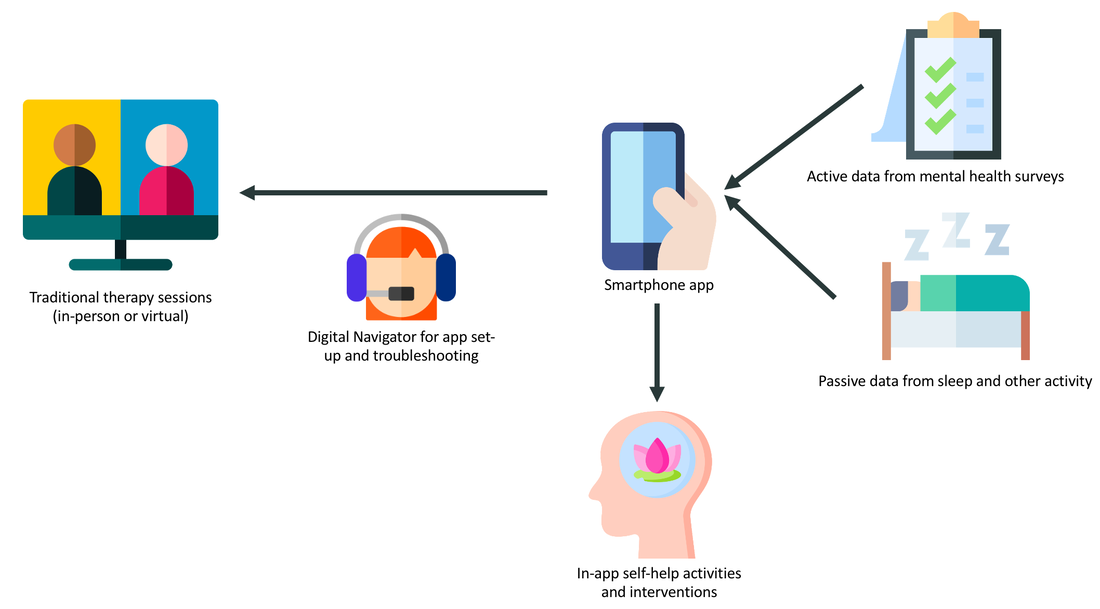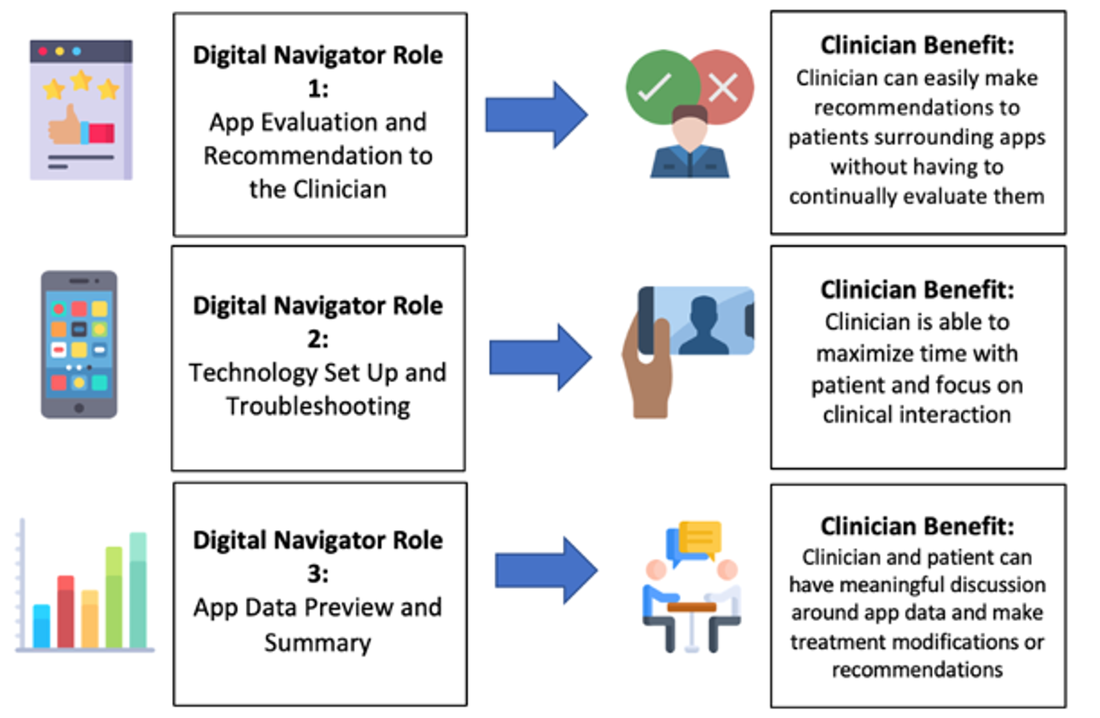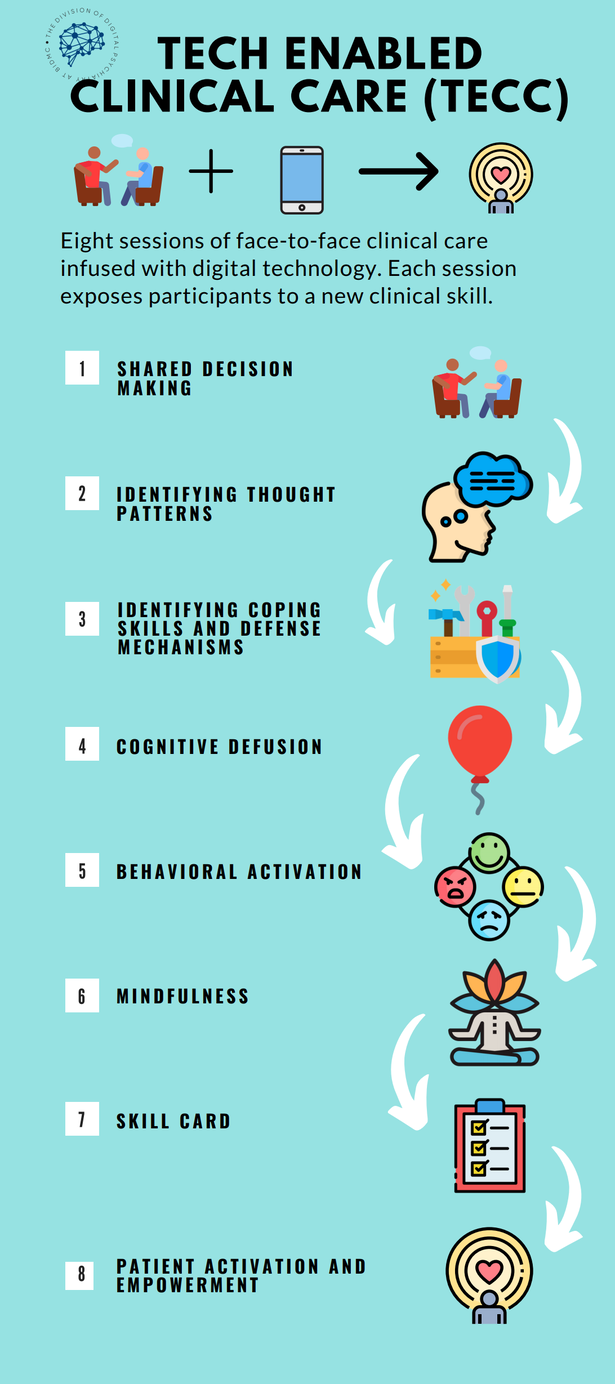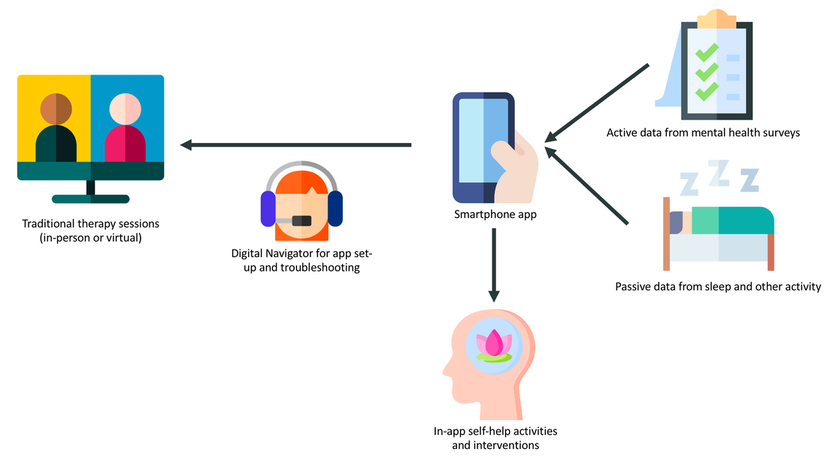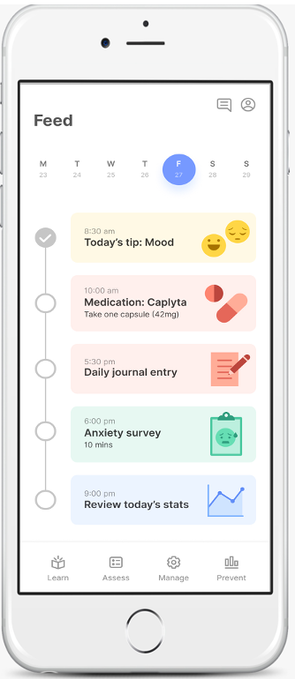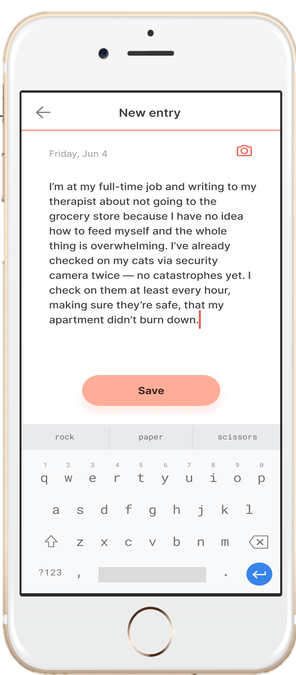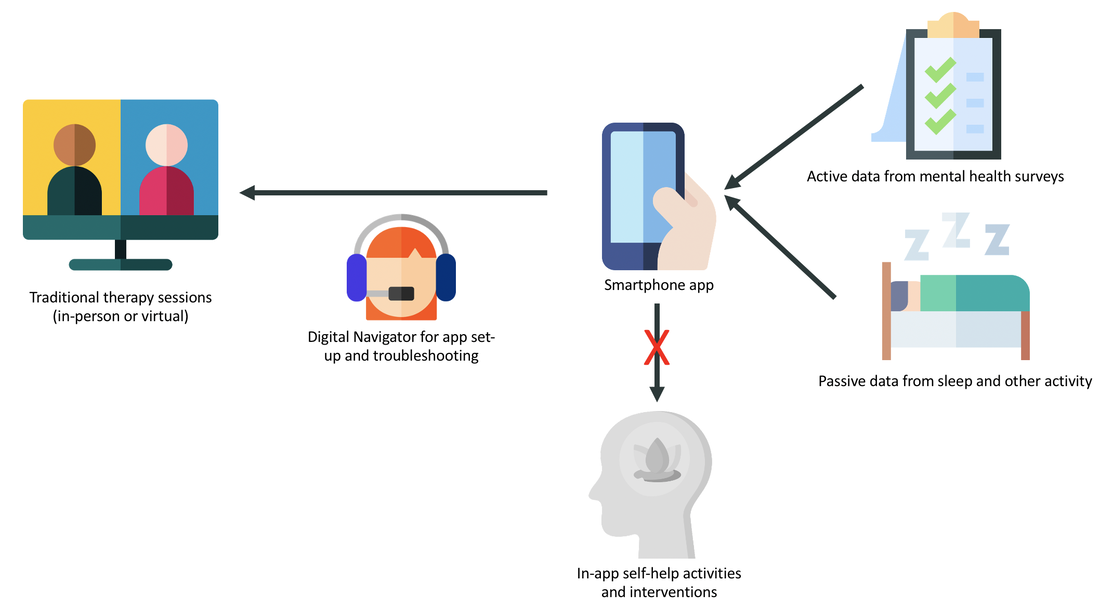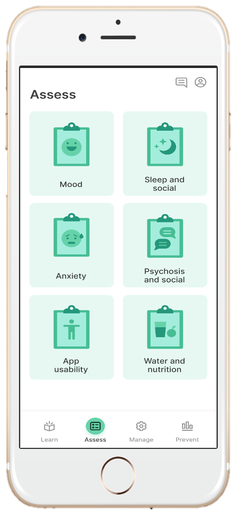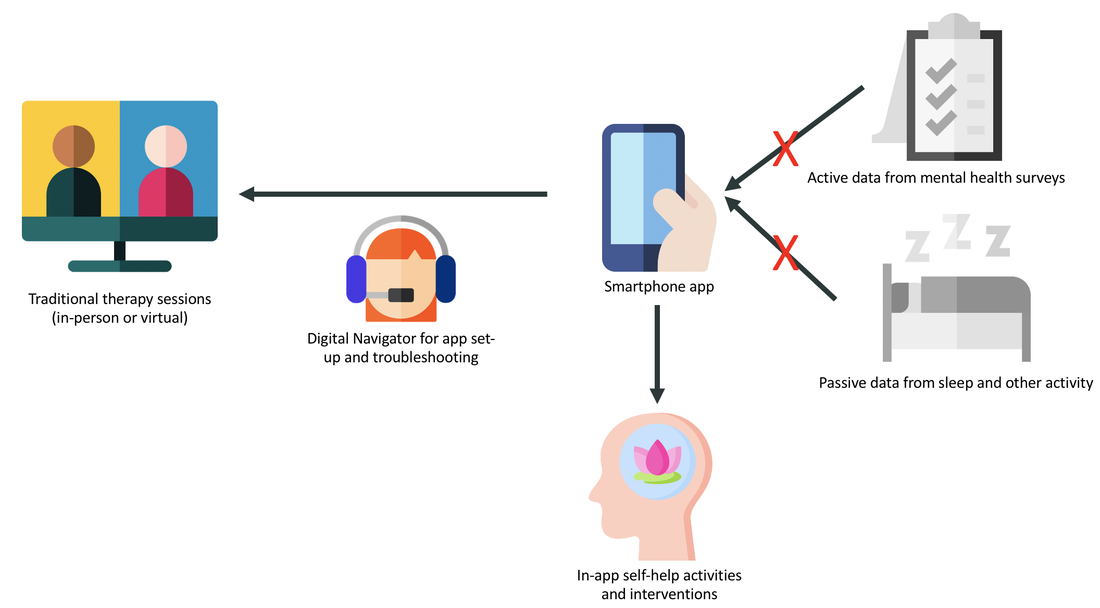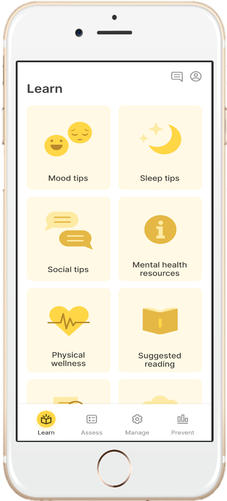What is the Digital Clinic?
|
The Digital Clinic is a fully operating therapeutic clinic integrating technology from smartphone apps and sensors into outpatient visits to improve care. Patients meet regularly with a clinician and use the mindLAMP app between visits to monitor symptoms, access tips and resources, and complete clinician-assigned exercises. The Digital Clinic is currently running in English and will soon be available in Spanish!
|
How does the Digital Clinic operate?
Traditional face-to-face clinical sessions are held either in person or over a video-conferencing platform. A smartphone app (mindLAMP) is used by the patient to complete symptom and mood surveys and to allow for passive data collection (i.e. hours of sleep, number of steps per day) on metrics that may relate to mental health between clinical sessions.
Data from mindLAMP is reviewed during each clinical session so the clinician can offer treatment with more insight into the patient's unique experience.
Following each clinical session, a Digital Navigator (or tech support) meets with the patient to further customize the app according to the clinician and the patient's preferences.
Data from mindLAMP is reviewed during each clinical session so the clinician can offer treatment with more insight into the patient's unique experience.
Following each clinical session, a Digital Navigator (or tech support) meets with the patient to further customize the app according to the clinician and the patient's preferences.
What is a digital navigator?
|
A digital navigator supports the clinician by handling the technical aspects of the digital clinic from app set-up and customization to troubleshooting so the clinician is free to spend a full meaningful session with a patient.
Some tasks of the digital navigator include:
|
The mindLAMP app
The mindLAMP app is used in conjunction with face-to-face care, but in no way replaces the role of the clinician. The app consists of four pages, spelling the acronym LAMP.
Learn: Patients can access helpful mental health resources and tips. The clinician can specify what resources are available to each patient.
Assess: Patients can complete surveys about their symptoms, moods, and activities. These surveys are customized by the clinician and patient to address specific needs.
Manage: Patients can complete activities and learn skills to manage symptoms such as a mindful breathing activity, a journaling feature, and more. Here, the clinician can also create activities for each patient.
Prevent: In this section, patients can view all data collected in the app and track their own treatment progress. This section also allows patients to leave messages for their clinicians.
Assess: Patients can complete surveys about their symptoms, moods, and activities. These surveys are customized by the clinician and patient to address specific needs.
Manage: Patients can complete activities and learn skills to manage symptoms such as a mindful breathing activity, a journaling feature, and more. Here, the clinician can also create activities for each patient.
Prevent: In this section, patients can view all data collected in the app and track their own treatment progress. This section also allows patients to leave messages for their clinicians.
BI Needham Digital Clinic
https://vimeo.com/873080963?share=copy
TECC: Technology Enabled Clinical Care
An educational, short-term, technology infused mental health study
|
The Digital Clinic is currently enrolling for the TECC study! TECC runs for 8 sessions and teaches 8 different clinical skills using the mindLAMP app to support patients outside of clinical sessions. While each session of TECC emphasizes a different therapeutic skill, the general flow of the therapeutic session remains the same.
In each session, the patient will:
Enroll in TECCEligibility criteria
Please contact Erlend Lane to check your eligibility status or enroll in TECC! elane1@bidmc.harvard.edu
| |||||||
Customization of the Digital Clinic model
TECC and the digital clinic model are highly customizable, emphasizing effective and personalized care. The following examples demonstrate the flexibility and customization of the Digital Clinic which is driven by patient's comfort level with digital technologies and individual needs.
Case A: Complete integration of digital technology in care.
|
In this case, digital technology is used both in and out of clinical visits with the goal of helping understand the patients experience with their own mental health and offering app based support and help. The patient completes daily surveys and captures data like step count and sleep from their phone, information which the clinician reviews during each session. This process promotes more comprehensive care options by taking into consideration different aspects of a patient's environment.
Using this data, the clinician and patient co-create a plan and pick app based activities to add to the patient's daily feed. Activities are picked with the goal of promoting the most relevant skills for each person, so may vary person to person. |
Case B: Partial integration of digital technology into care
|
TECC is designed to be flexible and meet patients where they are in terms of interest and comfort using technology. Some patients may choose to omit daily activities and app interventions from their care and use the app as a data collection tool instead. In this case, the app would still notify the patient to complete daily symptom and mood surveys, as well as collect passive data, but the Learn tips and resources and the Manage activities would be used on a self-help basis only. In this set-up, the data collected by the app is still personalized to each patient and reviewed with the clinician during visits. This data can be used to better understand each patient's unique clinical trajectory, personalize care, and offer preventive mental health services.
|
Case C: Low level of integration of digital technology into care
|
TECC also works with less use of technology as some patients may not wish to collect data via apps. Regardless, patients may choose to use the mindLAMP app, or another app, as a self-help resource alongside their clinical visits. Apps can help augment therapy skills, offer reminders, or help provide extra support at just the right time. TECC offer resources to help match each person with the right app for them using our mHealth Index and Navigation Database (MIND) containing ~250 apps: https://apps.digitalpsych.org/. You can learn more about MIND and how it serves patients in our presentation to the Federal Trade Commission (FTC) here.
|
Published articles about the Digital Clinic:
Rodriguez-Villa, E., Rauseo-Ricupero, N., Camacho, E., et al. The digital clinic: Implementing technology and augmenting care for mental health. General Hospital Psychiatry 2020. See Article.
Torous, J., Jän Myrick, K., Rauseo-Ricupero, N., et al. Digital Mental Health and COVID-19: Using technology today to accelerate the curve on access and quality tomorrow. JMIR Mental Health. 2020. See Article.
Torous, J., Jän Myrick, K., Rauseo-Ricupero, N., et al. Digital Mental Health and COVID-19: Using technology today to accelerate the curve on access and quality tomorrow. JMIR Mental Health. 2020. See Article.


